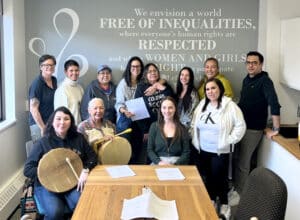Atira Indigenous Leadership Council
“The Atira Indigenous Leadership Council exists to represent Indigenous voices, governance, and equity within Atira by advising on policy, leadership, and cultural integrity. We advocate for meaningful inclusion, ensure accountability, and strive for systemic change that honours and empowers Indigenous staff and communities.”
Atira Indigenous Leadership Council (AILC), Mission Statement
The Truth and Reconciliation Commission’s (TRC) Calls to Action and the Missing and Murdered Indigenous Women and Girls (MMIWG) Calls for Justice urge the corporate sector to adopt the United Nations Declaration on the Rights of Indigenous Peoples (UNDRIP) as a framework for reconciliation.
Atira, recognizing that it operates as a guest on the unceded territories of xʷməθkʷəy̓əm (Musqueam), Sḵwx̱wú7mesh (Squamish), and səlilwətaɬ (Tsleil-Waututh), q̓ic̓əy̓ (Katzie), q̓ʷɑ:n̓ƛ̓ən̓ (Kwantlen), Semiahmoo, kʷikʷəƛ̓əm (Kwikwetlem First Nation) and Lək̓ʷəŋən (Lekwungen) Peoples.
Atira has endeavoured to centre Indigenous voices and create meaningful, lasting change. Its leadership has committed to structural reforms that ensure Indigenous voices are not only heard but acted upon.
 The Atira Indigenous Leadership Council (AILC) workshop brought together Indigenous staff to engage in critical discussions about representation, governance, and meaningful change—advancing efforts toward genuine Indigenous inclusion within Atira. Participants shared deeply personal motivations for their involvement, reflecting on lived experiences, professional journeys, and their commitment to advocating for Indigenous voices. For many, their engagement is rooted in firsthand experiences of oppression and discrimination—witnessing family members and communities struggle, yet persist. Their dedication stems from a desire to create spaces where Indigenous perspectives are valued, respected, and implemented.
The Atira Indigenous Leadership Council (AILC) workshop brought together Indigenous staff to engage in critical discussions about representation, governance, and meaningful change—advancing efforts toward genuine Indigenous inclusion within Atira. Participants shared deeply personal motivations for their involvement, reflecting on lived experiences, professional journeys, and their commitment to advocating for Indigenous voices. For many, their engagement is rooted in firsthand experiences of oppression and discrimination—witnessing family members and communities struggle, yet persist. Their dedication stems from a desire to create spaces where Indigenous perspectives are valued, respected, and implemented.
The evolution of the AILC—from its origins as the Atira Indigenous Advisory (AIA)—marks an important shift from an advisory body to a governance body with real influence over Atira’s policies, programs, and Indigenous staffing decisions.
Council members are deeply committed to giving back to the community. Many emphasized their responsibility to future generations and the importance of ensuring that Indigenous children and youth grow up with a strong connection to their history, culture, and the resilience of their people.
